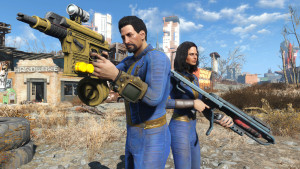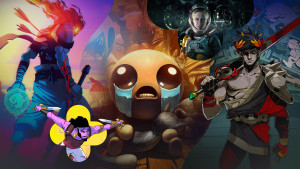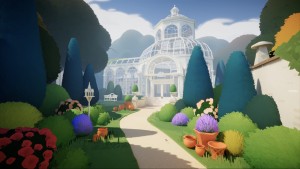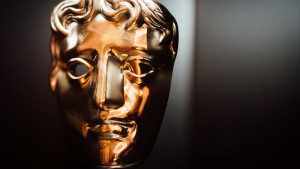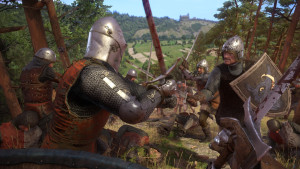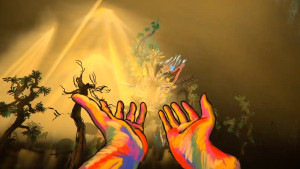Please support Game Informer. Print magazine subscriptions are less than $2 per issue
Dead Space Composer Jason Graves Explains The Unsettling Score
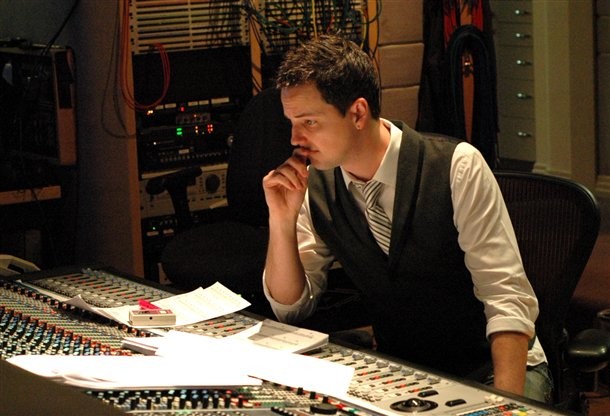
Award-winning composer Jason Graves has provided his musical talents to the gaming industry for the past eight years, and has successfully caused gamers to jump out of their seats with his work on the scores for the Dead Space franchise. The classically-trained composer explains what it takes to craft "the scariest music anyone has ever heard."
Composing for the video game industry
Originally I had my sights set on film and television music, and this was in 1995. Nobody knew who I was. I didn’t know anyone or have any connections. All the jobs I got were “Copy this score, we want it to sound like Star Wars. We want it to sound like Rambo.” Creatively it just wasn’t a lot of fun. I did that for a while, but I decided out of it. I was really busy and working a lot, but it wasn’t fun.
I got my first game about eight years ago and it was King Arthur. They wanted it to sound like Hans Zimmer, obviously, because he was going to score the film. That was the only musical direction I had. I got to write 40 minutes of music, whatever I wanted, as long as it more or less sounded like Hans Zimmer. No corrections, tons of fun, and it was like “This is what I’ve been looking for.” I’m getting paid to write music and I get to write what I want to write.
Landing the Dead Space gig
I believe there was a general demo call out from EA and they were just looking for stuff. They knew they wanted scary music. I’m actually a classically trained composer and my background is in 20th-century music (that’s what I originally studied in school) so I had some stuff I could submit that was kind of out there in terms of horror music. They had a couple of suggestions from film so I put together one custom piece and that’s how they ended up hiring me. The original audio director called and was just raving about how on point everything was that was sent. It was exactly what they were looking for. It was kind of the easiest job I’d ever gotten. Even when I was submitting stuff it was like, “Is this really what they want? I’ll put it in and we’ll see.”
Preparing for the job
I definitely wanted to avoid any kind of influence from previous games, film, or television stuff. The idea was, no small task, but EA wanted me to write the scariest music anyone had ever heard. Period. With my background in 20th-century classical music I just kind of dove into all these really modern chaotic experimental scores. Nothing electronic or musique concrete, all with the orchestra. It’s kind of where I come from anyway so it was a real natural transition for me.
Composing "the scariest music anyone has ever heard"
Essentially 20th-century music is my bible. There’s all these techniques and effects that players can do. I had a shorthand list of experimental ideas that I then went and put in front of the orchestra. The nice thing was, as with all Dead Space stuff, is we have more than one recording session. The ironic thing is the recording sessions always come before the music’s written. I have to get all these effects and things just so that EA can hear what it sounds like. I can say I’m going to have all the string players tap the wood on their instruments with their fingernails when there’s no pre-recorded sound for that. The idea was get the palette of sounds down first and then write the music with those sound palettes. Then we would go halfway through the music production cycle and have another recording session and build on what we got the first time.
The idea was all the crazy stuff is what we got the orchestra to do and then I would come back and analyze everything. We’d have hours of recording, literally we’d record 50 minutes every hour and I would then have 50 minutes of material when we left. There’s no wrong notes. It takes longer for me to explain [to the orchestra], “Yes, yes that’s what I want you to do.” After the first hour the musicians understand that there are no chords. There are no unisons. That everything is just barely controlled chaos. So I would take all these things back, 10, 12 hours of material just after one of these sessions then analyze it, cut it all up, figure out how to incorporate it into pieces of music, and then write pieces of music around or with these textures, which is why the score has such an unusual yet horrific sound.
Creating an infected sound
I wanted to try to do something as original as I could without having it sound too derivative, and obviously with horror music there’s going to be some “been there heard that” kind of stuff. There are things that work and are used all the time, but I try to put a new slant on them to make everything different. In a way, the Necromorphs in Dead Space are these humans that have been infected and mutated as monsters, and I thought that was the perfect thrust for me as a composer to take the music, which is being performed by humans, but just mutate it, infect it, and twist it around into this completely unrecognizable sound. It’s the fact that you don’t recognize what it is that scares you.
A cacophony of chaos
I’d have 60 string players in the room by themselves, or 12 or 16 brass players in the room by themselves, and I would just have everyone play a random note. Of course everyone had questions [laughs]. I would say, “Play any note you want” and everyone has got a question. “Really play anything!” and that’s where a lot of the ambient stuff that you don’t even realize is music actually comes from. Especially with the strings because it’s just this texture, a sound effect like the tone of a room, but it’s off somehow and it doesn’t necessarily sound like strings or brass or woodwinds when they play it because traditionally that’s not how you have them play. If you’ve got 60 string players you maybe have five or eight notes that are being played, I’ve got 60 different notes that are all being played at the same time. That was one of those ideas of the unknown making you uncertain, unsettled, and then building up anxiety.
The other very common one in traditional 20th-century stuff is just have them play a bunch of notes really, really fast. So if you have a monster right on top of you, you’ve got 60 players playing 60 different notes all at the same time super fast. It’s just this cacophony of chaos that’s barely controlled. What’s nice is the antithesis of each other because one is calm and spooky, and the other one’s completely in your face, bubbling and nerve-wracking.
Building tension that can make bunnies seem terrifying
My role is to build up the tension, building up the anticipation and anxiety before something actually jumps out at you. Once you’re fighting, sure I’m doing combat music that puts you on edge, but the key to the score working really well in the game was all the ambient stuff before you get attacked. That way you’re really unsettled, you’ve got this really creepy feeling, and you’re not exactly sure why. Sure where you’re walking looks kind of creepy, but nothing is happening yet. I figured if I did my job right you could have a giant floppy bunny rabbit hop from around the corner and you’d still jump out of your seat because the tension was just so intense you could hardly stand it. You take the music away and that just doesn’t work. That’s the power of music in the games. It’s the unheard, unknown aspect that you could just subconsciously get the player and unhinge them a little bit. They don’t know why they just know they don’t like it.
Effectively syncing music to onscreen action
A lot of the interactive aspect of the music is owed to the original implementation of the first game, and we just kind of doubled up on the second game, so all the music I deliver is anywhere between four and eight streaming stems. The idea is the closer the player approaches a physical marker that is marked as being scary (like the corner of a really long hallway) the more frenetic and crazy the music gets the closer you get to the corner. Or it [the marker] could be on a Necromorph that could be moving around, so even if you’re standing still, the closer he gets to you, the music starts building up. Say you’re walking toward the corner, and it’s got implementation into it that the closer you get the scarier the music gets, and you’re like, “Um, I’m not going to do that” and you stop, the idea with the music is it’s still moving, but not increasing anymore. Then you can walk away and go back toward the other end of the hall and the music goes back down. It’s really an interactive system that allows seamless integration. I think it works great.
So what I end up doing, I have a two-tiered approach. The first one is the creepy music and do that in a couple of layers and compose them knowing that they’re going to be stacked on top of each other in an additive way. The more layers get added on, the more creepy and suspenseful it gets. Eventually somewhere in there I’ll start some combat layers as well. Everything depends on different events in the game, but the combat music kicks in when something is actually attacking you and that also has varying degrees. If there are guys down the hall running toward you, it’s a moderate pause, but once they’re giving you a hug and chomping on your neck, the whole orchestra is going crazy.
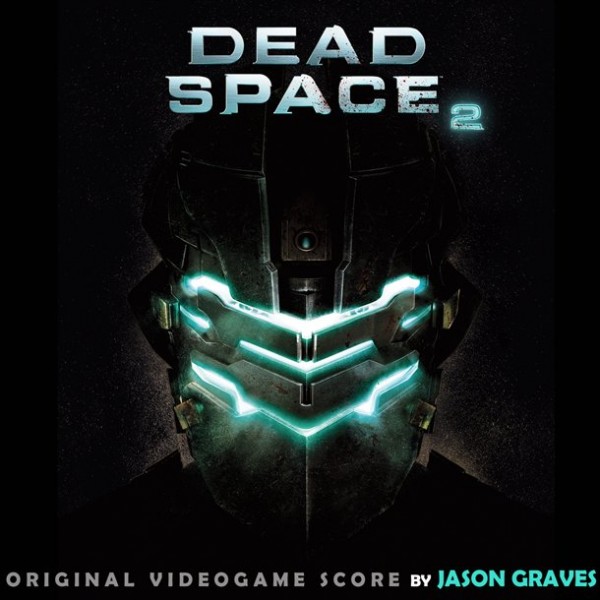
Horror vs. traditional scores
The beautiful thing about horror music is the one rule that you always have to follow to write really good horror music, and that is there are no rules. You can literally do anything you want and most of the pieces I do don’t even have what is traditionally considered a tonal center. The fact that there is no perceivable key, or theme, or melody is another aspect of the non-musicality that really puts listeners or players on edge because they never know what to expect next.
Biggest fears
I’ve got a fear of heights. Not like 10 stories, but like 80 stories. I’ve definitely got a vertigo thing going on. I noticed what really puts me on edge from the music and what got me every time is really high violins. I’ve used them a lot in both games. A really high note, almost like a seasick kind of note because it never quite stays in pitch. The wavering back and forth just gets under my skin and it probably does the same thing to everyone else even more. I think because it’s almost a pitch, but not really. It’s obnoxious. That’s probably the one sound that really gets to me.
Gamer
I was a huge gamer when I first started working in the industry about eight years ago. My enthusiasm has only increased for games, especially music in games. My skills as a gamer has decreased as my workload has increased, especially over the last three years. I do play as much as I can. I do have every console known to man at my house. I also play a lot of titles that have great music implementation. More oftentimes than not I play the game that I’m working on either at the developer’s or my studio. At the end of the day not really so excited about playing another game. I do that on the weekends. That’s probably not the right answer to give Game Informer, but hey what do you want? [Laughs]
Influential game soundtracks
The first game soundtrack that made me think, “That’s really cool, I want to do something like that” was the first Medal of Honor because it didn’t sound like “game music” to me. It sounded more like a film score or a piece of classical music, and that’s my background, classical stuff, so that’s what piqued my interest in possibly doing music for games. I also thought the LittleBigPlanet score was a lot of fun. I play that with my kids a lot.
Favorite composers
I’m a huge fan of Igor Stravinsky. He broke a lot of boundaries for classical music. What I love about his music is he’ll write some completely atonal stuff, but he’ll also write just as beautiful tonal music. It’s that combination of those two that makes it really powerful, which is what I did with the second Dead Space score, really crazy atonal stuff. Stravinsky definitely. Also, Krzysztof Penderecki. He’s a Polish composer. He’s still alive so he’s very much a modern 20th-century composer.
In film I really love Bernard Herrmann. I thought that was like when The Beatles came into pop music. When Bernard Hermann arrived it was like wow, this is how film music is going to be written for the next 200 years.
Importance of music in games
I think it depends on the genre of the game. If you’re playing Wii tennis, yeah you don’t have to have the music playing. You can play anything you want. If you’re playing a first-person shooter, I think it’s going to have a lot more impact on how immersive the gameplay experience. With technology and game developers becoming so much more aware now of how to have interactive music, the interactive music is the key to having a totally effective music in the game experience. It’s personal preference, I have no problem if someone wants to turn the music off, but interactivity is my saving grace that’s why I’m still doing games. It keeps getting more interactive. The more scores I do that way the more I learn, and the more I learn the more interactive scores get. It’s a wonderful cycle.
Reactions to original Dead Space score
Working on the first Dead Space was both the most challenging and rewarding project. I really wanted to do it right. I really wanted to do something different, obviously. I thought it was so out there and so non-musical that it would get swept under the rug with all the other horror soundtracks that came out for games. It seems like it was so different and non-musical that it caught a lot of people’s attention, so when it started getting nominations and winning awards I was really shocked, pleasantly surprised of course. It was definitely interesting to think of all the dissonance I wrote that’s getting all this attention, and I’m not a dissonant kind of composer. Dead Space was the first thing I’d ever done. It was my first foray into horror so it was wonderful to get that kind of attention, but it always put this kind of pressure on myself to deliver the same kind of thing, but amp up the scare factor even more. I’m really excited. After the first one where I dismissed it once I was finished I’ve got this anticipation built up to see what people think because the bar is certainly set high. I can’t wait.
Live Performances, "Lacrimosa"
There’s a piece I wrote outside of the game called “Lacrimosa” that uses the major themes from Dead Space 2, but also uses the scary effects. It was a really cool way to set a small string ensemble apart from this giant orchestra that played most of the score. We’re working on getting some stage performances of it. The advantage of games over film is you have this space to have a musical arc like that not tied down to a picture. That’s what I’ve always loved about games, not just the creative freedom, but the musical freedom to experiment and stretch a little bit musically speaking. I was a lot less scared this time around. With the first Dead Space I didn’t know if any of it would work. This time I had a little more confidence. I pictured myself as Isaac because he was terrified in the first one and had no idea what was going on, and this one he’s been there done that. I know how this works, this is what we’re going to do. That’s how I was as a composer.
What’s next?
The question is what do I have going on that I can talk about [Laughs]. I’m doing a fantasy game that’s a lot of fun and I finished up another big horror game coming out this year. There are five game projects that I’m working on right now. I’m also doing independent films and a stage production. Variety is the spice of life, but my focus is and probably always will be games. That’s what I love to do.
For more on Jason Graves, be sure to check out his official website.

